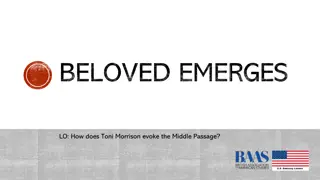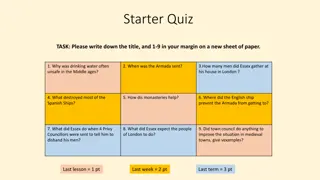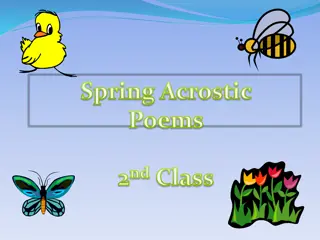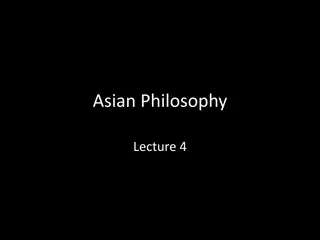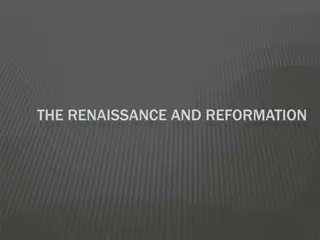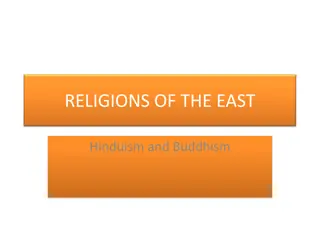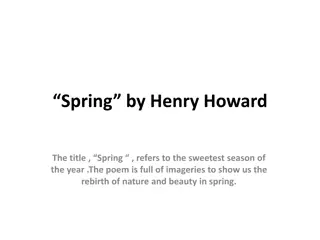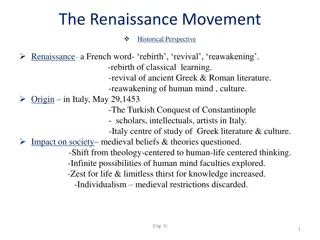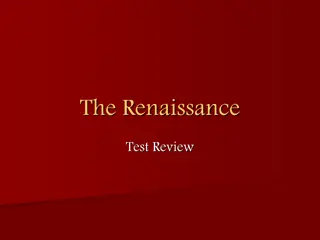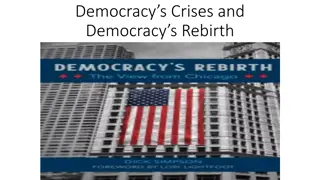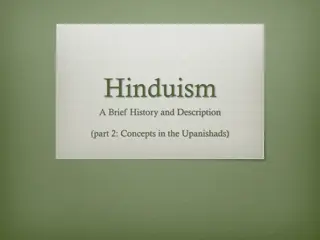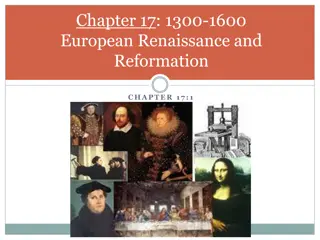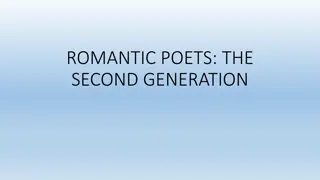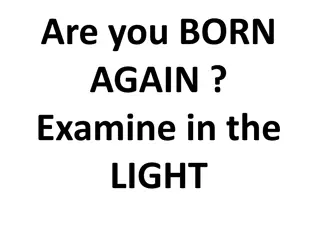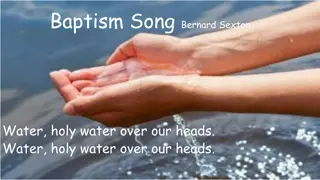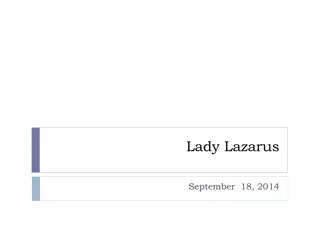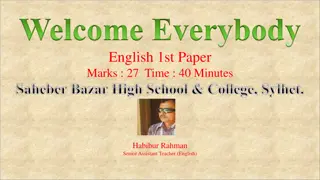Guru Har Krishan and Sikh Beliefs about Death
Guru Har Krishan, at a young age, cared for those dying in a smallpox outbreak in Delhi, showcasing Sikh beliefs in reincarnation and mukti. Sikhs believe in life, death, and freedom from the cycle of rebirth to unite with God. The purpose of life on earth is to make one's mind God's home and attain
0 views • 10 slides
Examining Water Imagery in Toni Morrison's "Beloved" and Its Contextualization with Historical Events
Toni Morrison skillfully evokes the harrowing Middle Passage experience in "Beloved" through water imagery, symbolizing themes of cleansing, rebirth, and trauma. By comparing the water symbolism at various points in the novel, readers can explore its significance in relation to historical events lik
6 views • 14 slides
Analysis of "Ode to the West Wind" by Shelley
The "Ode to the West Wind" by Percy Bysshe Shelley is a poetic exploration of the powerful and destructive force of the wind, symbolizing death and decay, yet also representing renewal and rebirth. The poem delves into themes of nature's cycles, the poet's role in promoting change and rejuvenation,
1 views • 52 slides
Impact of the Renaissance on Medicine in Early Modern Britain
In the early modern period in Britain from 1450 to 1800, the Renaissance brought about significant changes to medicine. This era marked a rebirth in Europe with increased interest in classical architecture, art, and scientific advancements. The impact of the Renaissance on medicine included the chal
9 views • 8 slides
Joyful Spring Acrostic Poems from 2nd Class Students
Delight in the whimsical acrostic poems created by 2nd class students as they joyfully express their love for spring. Each poem beautifully captures the essence of the season with vivid imagery and heartfelt sentiments, celebrating the rebirth of nature and the wonders of springtime through the eyes
0 views • 12 slides
The Two Trends of Indian Philosophy: Naturalism vs. Spiritualism
Indian philosophy is characterized by two dominant trends - naturalism/materialism and spiritualism/theism. The Charvaka school represents the naturalistic perspective, rejecting Vedic authority and advocating for materialism. They emphasize perception as the sole source of knowledge and deny concep
0 views • 15 slides
The Renaissance and Reformation in Italy: A Historical Overview
The Renaissance and Reformation in Italy marked a period of rebirth and transformation between 1350 and 1550. The Italian Renaissance saw a resurgence of interest in ancient Greek and Roman cultures, characterized by urban growth, secular viewpoints, and a focus on individual ability. City-states li
0 views • 91 slides
The Power of Being Born Again
Explore the biblical teachings on being born again, as exemplified through encounters with Jesus and the transformative impact it has on believers. The concept of spiritual rebirth, redemption through Christ's sacrifice, and living with unfeigned love are all discussed, emphasizing the importance of
0 views • 22 slides
Exploring Hinduism: Gods, Beliefs, and Practices
Hinduism, a diverse and ancient religion, encompasses a rich tapestry of beliefs, deities, and spiritual practices. Rooted in the concept of Brahman as the unchanging force in the universe, Hinduism reveres a pantheon of gods like Brahma, Vishnu, and Shiva. The ultimate goal for Hindus is to achieve
0 views • 60 slides
Analysis of "Spring" by Henry Howard
The poem "Spring" by Henry Howard beautifully captures the essence of the season, showcasing the rebirth of nature and the beauty that comes with it. Through vivid imagery and poetic devices, the poem progresses from the emergence of spring and its delightful transformations to the anticipation of s
0 views • 6 slides
The Renaissance Movement: Historical Perspective and Impact on English Literature
The Renaissance, meaning "rebirth," was a period of revival in classical learning, centered in Italy after the Turkish Conquest of Constantinople in 1453. This era saw a shift from medieval beliefs to human-centered thinking, with a focus on exploring the limitless possibilities of the human mind an
0 views • 9 slides
Unveiling the Renaissance: A Journey of Rebirth and Humanism
Explore the transformative era of the Renaissance, a period of rebirth, flourishing art, literature, and humanistic revival after the dark Middle Ages. Discover how individuals embraced humanism, literacy thrived with the printing press invention, and the beauty of classical works was rekindled, sha
0 views • 11 slides
Challenges and Opportunities for Democracy's Future
Exploring the current crises facing democracy, this content highlights key challenges such as racial and income inequality, systemic racism, money in politics, low voter participation, polarization, corruption, and structural issues. It also addresses current crises like the pandemic, economic reces
0 views • 7 slides
Believing C.H.R.I.S.T. - Responding to John's Gospel
This passage from John 3:1-21 depicts the encounter between Nicodemus, a Pharisee, and Jesus where Jesus emphasizes the importance of being born again to see the Kingdom of God. The dialogue delves into the concept of spiritual rebirth and understanding the Kingdom of God. Nicodemus, seeking answers
0 views • 20 slides
Concepts in the Upanishads: Brahman, Atman, Maya, Samsara, Karma, and Moksha
The Upanishads introduce profound concepts such as Brahman as the cosmic power, Atman as the soul within, Maya as illusion, Samsara as the cycle of rebirth, Karma as the moral law of cause and effect, and Moksha as liberation. These teachings emphasize the oneness of all existence and the quest for
0 views • 14 slides
European Renaissance and Reformation: A Time of Innovation and Transformation
The European Renaissance and Reformation period from 1300-1600 was a time of significant change and progress in art, learning, and religion. The Renaissance brought about a rebirth in art and human potential, with a focus on secular achievements and the support of patrons. Meanwhile, the Reformation
0 views • 29 slides
The Second Generation of Romantic Poets: A Revolution in Poetry and Ideals
The second generation of Romantic poets, including Keats, Byron, and Shelley, rebelled against societal norms, championing freedom, individuality, and social change. Their poetry reflects a struggle with language's limitations in expressing profound emotions and ideas. Percy Bysshe Shelley emerges a
0 views • 10 slides
The Path to Spiritual Renewal: Are You Born Again in the Light?
Explore the transformative journey of being born again in the light, as mentioned in various biblical verses. Reflect on the significance of spiritual rebirth, cleansing, repentance, and salvation through divine grace and mercy.
0 views • 39 slides
A Joyful Baptism Celebration with Bernard Sexton's Song
Embrace the sacred ritual of baptism with Bernard Sexton's uplifting song. Feel the cleansing power of holy water over our heads, symbolizing our rebirth as children of God. The flickering candle signifies God's presence, while the white garment symbolizes love and purity. Let this joyous occasion f
0 views • 4 slides
Analysis of Oppression and Death in Sylvia Plath's "Lady Lazarus
Sylvia Plath's poem "Lady Lazarus" delves into themes of oppression and death through the use of powerful imagery and allusions to Nazi Germany. The speaker in the poem expresses a complex relationship with death, portrayed as an art they excel at. The references to World War II and the Holocaust ad
0 views • 6 slides
History of the Olympic Games Revival
The passage highlights the cessation and revival of the Olympic Games, tracing back from ancient times to the modern era. After a 1500-year hiatus, Baron Pierre de Coubertin's efforts led to the rebirth of the games in 1896 with a new global competition framework. His vision aimed to promote unity a
0 views • 6 slides

